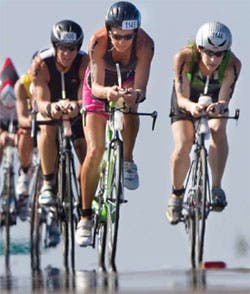Measuring Your Bike Miles: The Eddington Number
Trust me – like many things in life, this may sound complex to begin with but it’s really quite simple, it’s just a little tricky to describe in words. A couple of years ago, I noticed that I’d done 100 rides of 100 miles in a year. A friend commented that this was an Eddington number. Little did I know what he’d started by telling me this.

Some may think Sir Arthur Eddington’s biggest contribution to the world was his work on Einstein’s Theory of Relativity, but for me the bigger impact came from his love of cycling. He devised a measure of a cyclist’s long distance riding achievements. Your Eddington number is defined as the largest integer E, where you have cycled at least E miles on at least E days. For example an E of 60 means that you have ridden 60 miles or more on 60 or more days. Simple.
Be warned this is a hugely addictive measure. The Eddington number has the wonderful quality of progressively getting harder because not all the rides contributing to your current E number will count towards the next one. It’s a target to chase, not just a moving one, but one that accelerates!
When I first discovered this my E number was 116 and since then it’s increased to 127. It’s getting tougher. A solitary ride of 128 miles takes it to 128 but nine rides of 130 or more to get it to 130 and a whopping 97 more rides of 150 or more to reach 150. It makes me wonder what my lifetime limit is? Can I reach 150, 175 or even 200?
Like so many triathletes I have an obsessive side. What started as a solitary numeric marker soon snowballed. The principle can be applied not only to daily numbers but also to weekly and monthly figures. It can be applied in miles, kilometres, hours, minutes, across all disciplines and not only lifetime scores but also annual ones.
Before I knew it I was tracking 36 lifetime numbers and 24 annual numbers. This isn’t a simple task and certainly requires your training data in electronic format. As I tell my athletes who I coach, it’s worth collecting your training data now, as you never know, in seven years you may find yourself a triathlete with time on your hands wanting to play with the numbers.
It’s not just about the numbers, it’s about motivation. Targets in training can be helpful and this makes all of your training numbers valuable. It can also encourage doing that extra mile or even minute. I’m careful to use this motivation appropriately, and this year stopped my charge towards a new best annual bike Eddington number when I realised it was compromising appropriate training towards my racing goals. Sometimes, though, I feel I could train purely for the pursuit of Eddington numbers.
Some numbers are easier to improve than others. I wanted a measure of this and came up with maturity for each number. An example of a completely immature (maturity = 1) number is monthly bike kilometres, the estimate being that in a month I will have increased it. That’s not a challenge currently but as I age it may be the only one left to pursue. By contrast a massively mature (maturity = 2,504) number is daily hours. At 11 hours it’s already almost out of reach.
The Eddington number throws up some interesting challenges. For instance, my best ever annual weekly bike mileage is 50, this is 50 weeks of 50 or more miles in a year. The maximum for this is 52 so I decided to chase it this year. Easy you may think. Most of the time yes, but it’s those odd weeks, post race or in recovery where 52 miles seems a huge distance. Mid year I found myself struggling round a 12-mile ride like it was 150 just to get to 52 miles for that week. Only four more weeks and I’ll have it.
Yes, it’s addictive… I call it “training by the numbers.” I’ve even registered the domain EddingtonNumbers.me.uk, although I’m not sure what I’m going to do with it yet…
Steven Lord is a full-time athlete and coach with EverydayTraining. He’s been racing triathlon for eight years, completed Hawaii five times and is one of the sport’s most prolific writers. For more, see Everytraining.org.uk